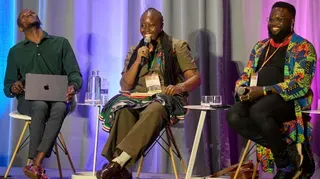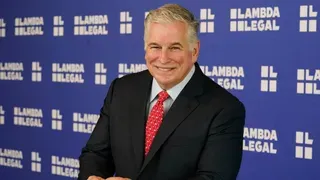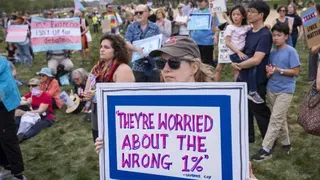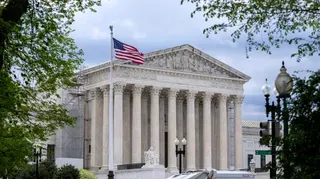January 5, 2009
Transgender Rabbi Blazes Trail for Observant Jews
Kilian Melloy READ TIME: 3 MIN.
The Jewish community has largely embraced its GLB members, with transgendered Jews now also being more widely accepted.
A Han. 5 article at Haaretz.com related the experience of Elliot Kukla, a rabbi in the Reform tradition of the Jewish faith, who disclosed that he was transgendered before he was ordained over two years ago.
In that short span of time, Kukla has seen the his faith open up to him.
The article quoted Rabbi Kukla as saying of his fellow Jews in the San Francisco area, "I'm so amazed at the old ladies who will turn to their friends and say, 'Did you meet the nice, young transgender rabbi?'"
Added the rabbi, "Some of that is San Francisco, but that conversation would never have happened a few years ago."
Jewish GLBT group Mosaic's executive director, Gregg Drinkwater, noted, "Transgender issues are really the next set of issues that the Jewish community feels it needs to address."
Added Drinkwater, "It's the next wave within the liberal Jewish community, certainly within the Reform and Reconstructionist movements, and in parts of the Conservative world."
Attitudes are evolving outside of the liberal wings of the faith, as well; the article referred to Leonard Sharzer, a Conservative Jew who, prior to becoming a rabbi, was a surgeon who performed gender reassignment operations for those who opted to change their genders physically, rather than by taking up names, dress, and habits in accordance with the gender with which they identified.
Sharzer, the article said, had weighed in with his own "rabbinic opinion" on a paper constituting an opinion by rabbi Mayer Rabinowitz that said that under Jewish law, transgendered individuals who opted for surgery to alter their physical genders ought to be honored as members of that gender.
The article quoted from Rabinowitz's opinion, which reads in part, "Those who claim that we can not change God's creation are closing their eyes to conversion, and to transplants as well as many other medical procedures which in fact do change God's creation."
The document continues, "[Jewish law] has always been macroscopic and not microscopic.
"Therefore, external organs determine the sexual status of a person."
Rabinowitz, who is an associate professor on the Talmud at the Jewish Theological Seminary, saw his rabbinical opinion approved by leaders of the Conservative movement.
Sharzer's contribution suggests that those who have not had such surgery ought also to be honored as members of the gender with which they identify.
The Ultra-Orthodox wing of the faith does not agree. The article quoted the director of public affairs for one Ultra-Orthodox group, Agudath Israel of America.
The director, Avi Shafran, said that under Jewish law, "and that's all that should matter to an Orthodox Jew, if the physiology is clearly male or female, then they are considered that."
Added Shafran, "Certainly the surgery [for gender reassignment] is not permitted.
"If post facto there was a change, to the best of my knowledge it doesn't make a difference either."
But ancient texts are more modern in some ways than may be widely known: said Congregation Sha'ar Zahav rabbinic intern Reuben Zellman, "Today in the Western world, we are very insistent about our binary gender system," but the Reform synagogue intern added that that was not necessarily an outlook shared by ancient scholars.
"Our sages talked about gender diversity in a much different way than we talk about it in contemporary America," Zellman, who himself is transgendered, said.
"They were, in some senses, much more open about what the range of human experience could really be."
Among various genders aside from "male" and "female" that ancient texts refer to, said the article, are "androgynos" (literally, "man/woman") and "tumtum," which is a gender in-between male and female.
Zellman cited the Babylonian Talmud, the article said, referencing a section in which rabbis consider whether Abraham's wife Sarah, incapable of childbirth, might have fallen into that mid-gender category.
Said Zellman, "What they say is that maybe [Sarah] didn't have a uterus."
Added the rabbinical intern, "In essence, maybe Sarah is not a woman in the way that we understand it."
Zellman and Kukla have created a resource called TransTexts, the article said, that looks at just such references to transgenderism and other non-binary gender issues in the faith's ancient writings.
Moreover, Kukla helped to create the online resource Transtorah.org.
The article also quoted the rabbi Denise Eger, of the GLBT Reform synagogue in West Hollywood, who said that while such gender issues may seem thoroughly contemporary, they, too, are part of history.
Said Rabbi Eger, "It's something that's always been there, but now perhaps we're able to shed a light on the journey and the spirituality of it."
Kilian Melloy serves as EDGE Media Network's Associate Arts Editor and Staff Contributor. His professional memberships include the National Lesbian & Gay Journalists Association, the Boston Online Film Critics Association, The Gay and Lesbian Entertainment Critics Association, and the Boston Theater Critics Association's Elliot Norton Awards Committee.







